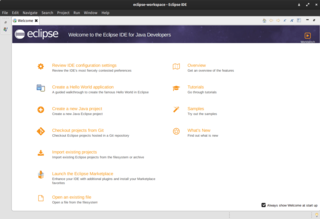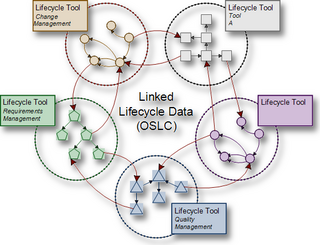
Eclipse is an integrated development environment (IDE) used in computer programming. It contains a base workspace and an extensible plug-in system for customizing the environment. It is the second-most-popular IDE for Java development, and, until 2016, was the most popular. Eclipse is written mostly in Java and its primary use is for developing Java applications, but it may also be used to develop applications in other programming languages via plug-ins, including Ada, ABAP, C, C++, C#, Clojure, COBOL, D, Erlang, Fortran, Groovy, Haskell, JavaScript, Julia, Lasso, Lua, NATURAL, Perl, PHP, Prolog, Python, R, Ruby, Rust, Scala, and Scheme. It can also be used to develop documents with LaTeX and packages for the software Mathematica. Development environments include the Eclipse Java development tools (JDT) for Java and Scala, Eclipse CDT for C/C++, and Eclipse PDT for PHP, among others.
Rational ClearCase is a family of computer software tools that supports software configuration management (SCM) of source code and other software development assets. It also supports design-data management of electronic design artifacts, thus enabling hardware and software co-development. ClearCase includes revision control and forms the basis for configuration management at large and medium-sized businesses, accommodating projects with hundreds or thousands of developers. It is developed by IBM.

PTC is a computer software and services company founded in 1985 and headquartered in Boston, Massachusetts. The company was a pioneer in parametric, associative feature-based, solid computer-aided design (CAD) modeling software in 1988, including an Internet-based product for Product Lifecycle Management (PLM) in 1998. PTC markets products and services and an Internet of Things (IoT) and augmented reality (AR) platform for partners and developers.
Maven is a build automation tool used primarily for Java projects. Maven can also be used to build and manage projects written in C#, Ruby, Scala, and other languages. The Maven project is hosted by The Apache Software Foundation, where it was formerly part of the Jakarta Project.
MKS, Inc is a subsidiary of PTC, Inc. It was previously a multinational independent software vendor that was acquired by Parametric Technology Corporation on May 31, 2011. MKS operated in the Application Lifecycle Management (ALM) and Systems Administration market segments.
WebSphere Application Server (WAS) is a software product that performs the role of a web application server. More specifically, it is a software framework and middleware that hosts Java-based web applications. It is the flagship product within IBM's WebSphere software suite. It was initially created by Donald F. Ferguson, who later became CTO of Software for Dell. The first version was launched in 1998. This project was an offshoot from IBM HTTP Server team starting with the Domino Go web server.
IBM Workplace is a discontinued a brand of collaborative software applications from IBM's Lotus Software division. It was intended to be the next generation of collaboration software that would work with IBM's Java EE-based WebSphere Portal server software. Introduced in 2003, the brand was largely disbanded by 2007, with its core technologies and many of its products rebranded as Lotus or WebSphere.
Microsoft Visual SourceSafe (VSS) is a discontinued source control program oriented towards small software development projects. Like most source control systems, SourceSafe creates a virtual library of computer files. While most commonly used for source code, SourceSafe can handle any type of file in its database, but older versions were shown to be unstable when used to store large amounts of non-textual data, such as images and compiled executables.
Tivoli Software encompasses a set of products originally developed by Tivoli Systems Inc. IBM bought the company and ran the operation as its Tivoli Software division. Additional products were acquired and run under the Tivoli portfolio brand. IBM began phasing out use of the Tivoli brand in 2013 and by 2016 had moved the portfolio products into a revised and rebranded hierarchy.
Rational Rhapsody, a modeling environment based on UML, is a visual development environment for systems engineers and software developers creating real-time or embedded systems and software. Rational Rhapsody uses graphical models to generate software applications in various languages including C, C++, Ada, Java and C#.
Aldon is a business unit of Rocket Software. It develops, manufactures, licenses and supports software change management products for the enterprise application lifecycle management (ALM) and software change management (SCM) markets.
VP/MS is a family of software components developed by CSC that support product development and product lifecycle management. Insurance companies use VP/MS to manage the rules, clauses, formulas and calculations associated with savings and both life and non-life insurance products. With VP/MS all calculations and queries for purposes such as quotes and administration are supported by a central repository of product definitions.
Micro Focus Application Lifecycle Management (ALM) is a set of software tools developed and marketed by Micro Focus (previously Hewlett-Packard and Hewlett Packard Enterprise) for application development and testing. It includes tools for requirements management, test planning and functional testing, performance testing (when used with Performance Center), developer management (through integration with developer environments such as Collabnet, TeamForge and Microsoft Visual Studio), and defect management.

Open Services for Lifecycle Collaboration (OSLC) is an open community, originally proposed in 2008, to define a set of specifications that enable integration of software development. It has evolved, and continues to evolve, to areas such as Application Lifecycle Management (ALM), Product Lifecycle Management (PLM), IT Operations and more. The intention is to make life easier for tools users and tools vendors, by making it easier for tools to work together.
PTC Windchill is a family of Product Lifecycle Management (PLM) software products that is offered by PTC. In 2004, as part of their expansion in the area of collaboration tools, they arranged having "a hosted version of Windchill to small- and medium-sized customers." As of 2011, products from its marketer, PTC, were being used by over 1.1 million users worldwide.
Helix ALM, formerly called TestTrack, is application lifecycle management (ALM) software developed by Perforce. The software allows developers to manage requirements, defects, issues and testing during software development.
Perforce Software, Inc. is an American developer of software used for developing and running applications, including version control software, web-based repository management, developer collaboration, application lifecycle management, web application servers, debugging tools and agile planning software.



